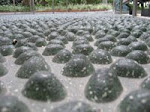I enjoy spending as much time as possible without my shoes and socks on. I grew up near a beach and could run around barefoot to my hearts content, it was natural to me. Now I live in an urban environment and it just isn't possible. I fear stepping on glass, dog muck, chewing gum etc I also fear people stepping on my long toes in the crowded streets-and lets be honest-the UK isn't the warmest of countries either! OK, so I have to settle with just going barefoot at home, but is there any other way? Well I first heard of Reflexology paths a few years ago and I have been keen to try one out. These paths are quite commonly found in parks and public spaces throughout Asia. When I started researching for this article I hoped to find evidence of reflexology paths in the UK but to my disappointment, I have found none whatsoever. The benefits of walking on a reflexology path are based on the same principles behind reflexology where the 7,000 nerve endings, muscles, ligaments and bones in our feet can influence everything from digestion and constipation to blood pressure and chronic pain. As in reflexology, this must be done barefoot for any effect. There are a couple of paths in the US that received some publicity a couple of years ago when they opened but I can't find ANY signs of progress in the UK.
What I have found is a Barefooting community who want us to understand that:
"It is healthy for your feet to go barefoot.
It is not against the law to go barefoot into any kind of establishment
including restaurants.
It is also not against any health department regulation.
It is not against the law to drive barefoot."
(Being as this is from an American based website, I am currently awaiting confirmation from the UK Driving Standards Agency regarding the last point.)
I also found Barefoot parks based in Austria and Germany that are open to the public and offer the opportunity to walk some distance (up to three miles) on natural ground and to feel a variety of materials with the bare soles. The Barefoot Parks website states:
"...visitors can enjoy balancing or climbing exercises and walk through brooks or even rivers. Some barefoot parks include playground sections designed for barefoot use. This healthy combination of barefoot hiking and playing has become a real touristic attraction."
I also found this list of quotes about barefooting.
And what about running barefoot? I remember the South African runner Zola Bud smashing the 5000m World record in 1984 and the reason I remember it? She ran barefoot.
Is there any evidence to suggest running barefoot is better for you or helps in some way? Well it seems to be a minefield of information and opinions but hey at least it's being discussed!
Australian physical therapist Michael Warburton published his research into barefoot running in 2001.
He concluded that:
"Running in shoes appears to increase the risk of ankle sprains, either by decreasing awareness of foot position or by increasing the twisting torque on the ankle during a stumble.
Running in shoes appears to increase the risk of plantar fasciitis and other chronic injuries of the lower limb by modifying the transfer of shock to muscles and supporting structures.
Running in bare feet reduces oxygen consumption by a few percent. Competitive running performance should therefore improve by a similar amount, but there has been no published research comparing the effect of barefoot and shod running on simulated or real competitive running performance.
Research is needed to establish why runners choose not to run barefoot. Concern about puncture wounds, bruising, thermal injury, and overuse injury during the adaptation period are possibilities.
Running shoes play an important protective role on some courses, in extreme weather conditions, and with certain pathologies of the lower limb."
Christine Dobrowolski, Podiatrist and the author of Those Aching Feet: Your Guide to Diagnosis and Treatment of Common Foot Problems wrote an article also enquiring about the benefits or barefoot running and summarized her findings as follows:
"There are probably a few individuals who could improve their performance and decrease their rate of injury by running barefoot. But, before you toss your shoes in the garbage can and head out for a run with naked feet, consider a better fitting shoe. Barefoot running is not recommended for individuals with a high arch, a very low arch, those who overpronate or those with diabetes. If you do decide to give barefoot running a try, choose the running surface carefully and be aware of puncture wounds."
Amby Burfoot of Runner's World published an article in 2004 and concluded in response to the same question:
"...many podiatrists think it's dangerous. "Most of my patients aren't worldclass runners," says foot doctor Stephen Pribut, DPM. "It wouldn't make sense for them to risk getting twigs and glass in their feet. And I think some soft surfaces increase plantar fascia and Achilles problems. Of course, what doesn't kill you might make you stronger."
This a-little-medicine-is-good-for-you perspective is shared by a number of other podiatrists, physical therapists, and coaches. Their theory: Modern man does spend too much time in shoes, and this weakens many of the foot and leg structures. To correct this, you can walk barefoot around the house, do simple foot strengthening exercises, or run a few barefoot miles a week on safe, secure surfaces."
Well there we have it-clear as mud! I hope to see urban public reflexology paths and more research carried out into the benefits of going barefoot in the near future. In the meantime, if you do live near a reflexology path, I would welcome your feedback -Do you use it? How widely used are they in your community? Any information you may care to share would be appreciated.
Yours barefooted,
The Foot
Subscribe to:
Post Comments (Atom)


No comments:
Post a Comment